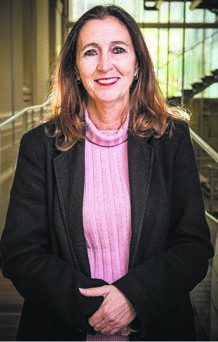
Professor Valerie Mizrahi, a recent recipient of the Harry Oppenheimer Fellowship Award of R1.5 million, fights the devastating disease with a sharp scientific mind that has made her a global leader in her field, writes Sue Grant-Marshall.
Tuberculosis (TB) kills more people in South Africa than any other infectious disease. According to the World Health Organisation (WHO), there were 22 000 TB-related deaths and 56 000 deaths of people with TB and HIV in 2017. Globally, 1.6 million lives are lost every year.
“This bacterium has tricks up its sleeve that enables it to cause disease to the extent that it overtook [the number of] HIV/Aids [patients] two years ago,” says Professor Valerie Mizrahi.
The renowned researcher into the science of TB is widely recognised as a global leader in the field. She recently received the Harry Oppenheimer Fellowship Award worth R1.5 million to further the valuable work done by her team at the Institute of Infectious Disease and Molecular Medicine at the University of Cape Town (UCT). As its director, she oversees hundreds of scientific, technical and administrative staff, among them 300 postgraduate students and 85 postdoctoral fellows working at the institute.
Although science “is at the very core of my being”, Mizrahi has a remarkable ability to convey her strong views about the astounding toll that TB takes on humanity.
“TB is caused by a bacterium [mycobacterium tuberculosis] that causes enormous damage to the lungs. It can be expelled with a cough or a sneeze. Anybody in the vicinity can breathe in the airborne pathogen and become infected,” she says.
“Normal” TB that responds to drugs is curable, provided the patient takes the medication regularly for six months. But drug-resistant TB is much harder to treat as doctors have to resort to medications that are less effective, have more severe side effects and are much more expensive.
Because TB is a notifiable disease, it is the state’s responsibility to treat it. Although drug-resistant TB only makes up about 5% of the 10 million new cases worldwide annually, its burden and cost to society is disproportionately high, says Mizrahi.
This is the driver behind her research into new therapies.
“However, we need a combination of new tools for controlling the disease – such as vaccines, biomarkers for diagnostics and new drugs,” she says.
The advent of HIV worsened the TB epidemic considerably. Between 50% and 70% of all TB cases in South Africa occur in people who are also infected with HIV.
“TB is the leading opportunistic infection associated with HIV. With the widespread roll-out of antiretroviral therapy, we have begun to turn the tide and are seeing a slow decline in the incidence of TB.
“We now have two new antibiotics that are showing great promise for the management of drug-resistant TB. But we need to do more, which will require adequate resourcing,” she says.
Workplace tip:I’ve raced through life and achieved a lot at a young age. Sometimes it’s better to be less rushed.
Mizrahi says that TB research is underfunded when measured against the number of people who contract TB and the many lives lost because of the disease.
Mizrahi emphasises the challenges involved in TB research: “We need a vaccine – it would be transformative if we could prevent people [from] getting this disease. There are also major diagnostic challenges.
“We really have a poor understanding of the whole TB transmission process,” she says. “It is a major research focus for people working in this institute.”
Mizrahi’s particular interest is in developing antibiotics “that can kill this bacterium stone dead”.
“We’re all working with the WHO to end TB. The WHO is pushing for a major reduction in the incidence of the disease by 2035 – that’s only 16 years away.”
The energetic and approachable professor obtained her PhD in chemistry at UCT in 1983 and worked in the US for six years before returning home. She moved into TB research in 1993, the year the WHO declared TB “a global health emergency”.
She came back to South Africa because she wanted to have children “and bring them up surrounded by my family in Johannesburg. I do not know how I would have coped without my mother and extended family support structure.”
Mizrahi, who has received numerous national and international awards for her work, says that, when she joined the world of science, “there were only a few women in leadership positions”.
“Research requires obsession, dogged perseverance and long working hours. It’s also hard to switch off when you get home. My two daughters – now in their twenties – would ask: ‘Mom, are you listening?’”
The professor says she might make a significant shift in her career in the next few years.
“But it will always involve youngsters, because the world of science belongs to them.
“I’d like to continue to train and develop young people, and will do so for as long as I can walk up these steps to my office.




 Publications
Publications
 Partners
Partners










